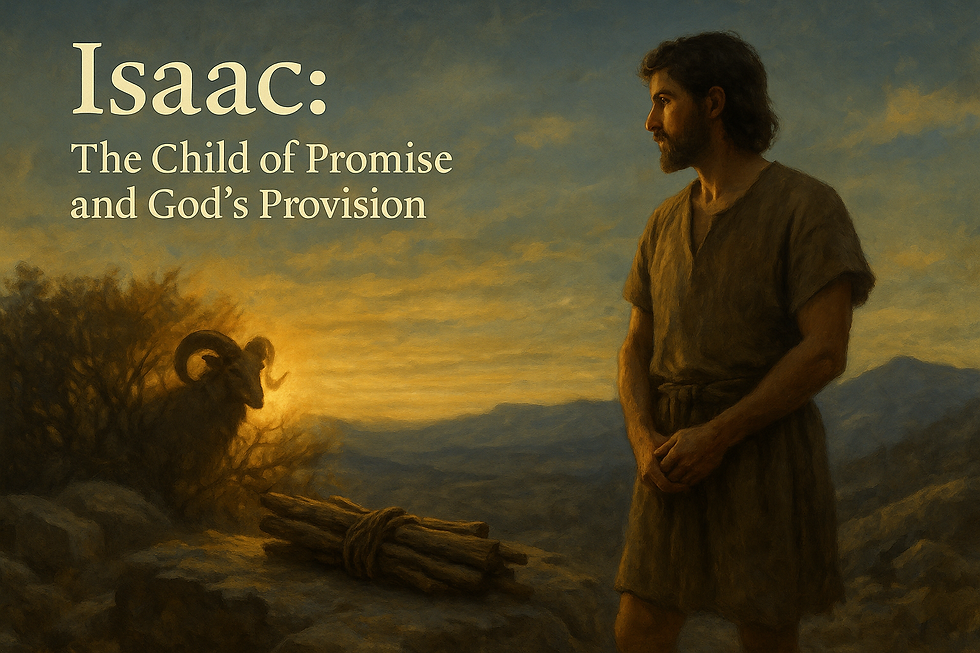Eliezer of Damascus: The Faithful Servant in Abraham’s House
- Bible Believing Christian

- Sep 2, 2025
- 4 min read

Eliezer of Damascus: The Faithful Servant in Abraham’s House
Eliezer of Damascus appears only briefly in Scripture, yet his presence represents faith, loyalty, and the way God often works through those who serve quietly. Abraham once thought Eliezer might inherit all he had, but God revealed that the covenant promise would come through Abraham’s own son. Eliezer is also traditionally associated with the servant who found Rebekah for Isaac, making him a key, though understated, figure in the covenant story.
Name & Etymology
The name Eliezer (אֱלִיעֶזֶר, ’Eli‘ezer, pronounced el-ee-eh-zer) means “My God is help.” This name itself speaks to his role as one who lived faithfully under God’s help and provision. In the Septuagint, his name is rendered Eliezer (Ἐλιέζερ).
Biblical Narrative (The Story)
Eliezer first appears in Genesis 15:2, when Abraham laments his childlessness: “O Sovereign Lord, what good are all your blessings when I don’t even have a son? Since you’ve given me no children, Eliezer of Damascus, a servant in my household, will inherit all my wealth” (NLT). At this point, Abraham viewed Eliezer as his heir, reflecting ancient custom that allowed a servant to inherit in the absence of children.
But God immediately corrected Abraham, promising that his heir would come from his own body (Genesis 15:4). This reaffirmed the covenant promise of descendants as numerous as the stars.
Though not named again, Eliezer is often identified with the “senior servant of Abraham’s household” in Genesis 24, the one entrusted to find a wife for Isaac. While Scripture doesn’t call him “Eliezer” in that chapter, many believe it is the same man. His mission to Nahor’s city is carried out with prayer, faith, and diligence. He prayed that God would guide him to the right woman, and Rebekah’s kindness fulfilled the very sign he asked for (Genesis 24:12–14).
He faithfully carried out Abraham’s instructions, giving gifts, negotiating with Rebekah’s family, and bringing her back to Isaac. In this way, he became the instrument through which God secured the covenant line.
Historical & Cultural Context
In the ancient world, a trusted household servant could hold significant responsibility, managing wealth, affairs, and even inheritance if no heir was present. Eliezer’s mention as Abraham’s potential heir shows both his loyalty and the deep trust Abraham placed in him.
His possible role in Genesis 24 reflects the ancient custom of arranged marriages, where family honor and covenant purposes were paramount. As Abraham’s steward, Eliezer embodied faithfulness in carrying out duties that shaped the course of Israel’s history.
Character & Themes
Eliezer is remembered as faithful, loyal, and prayerful. He was entrusted with Abraham’s greatest concern: securing the covenant line through Isaac. His prayer in Genesis 24 reveals dependence on God, and his joy when God answered shows gratitude and humility.
Themes of service, loyalty, faith, and God’s guidance flow through his story. Though not a patriarch, his obedience played a key role in ensuring the covenant line continued.
Connection to Christ
Eliezer’s role as the faithful servant points to Christ’s teaching about servanthood: “The greatest among you must be a servant” (Matthew 23:11, NLT). His mission in securing Rebekah for Isaac foreshadows the role of the Holy Spirit, who calls and gathers the bride of Christ, the church, for the Son.
Where Abraham represents the Father, Isaac the Son, and Rebekah the bride, Eliezer can be seen as a type of the Spirit — the faithful servant carrying out the Father’s will to bring the bride to the Son.
Theological Significance
Eliezer highlights how God works not only through the great patriarchs but also through the faithful service of those in supporting roles. He reminds us that God’s plan depends not on status but on faithfulness.
Theologically, his presence affirms God’s sovereignty: Abraham feared Eliezer might be his heir, but God promised otherwise. Yet the very man once thought to inherit became the instrument to secure the covenant heir’s bride, showing God’s wisdom in weaving together all roles in His plan.
Myths & Misconceptions
A common misconception is that Eliezer was Abraham’s heir until Isaac was born. While Abraham feared this, God had never indicated such a plan. Isaac was always God’s chosen heir of promise.
Another misconception is that Scripture names Eliezer in Genesis 24. The servant in that chapter is unnamed, though many Jewish and Christian traditions identify him as Eliezer based on his prior mention.
Some also assume Eliezer was merely a servant with no significance. In truth, his role demonstrates immense trust and spiritual maturity, being remembered as an example of faithfulness and prayer.
Application
Eliezer’s life challenges us to embrace faithful service. He worked behind the scenes, yet God used him to advance the covenant story. Like Eliezer, our faithfulness in seemingly ordinary roles can have eternal significance.
His prayerful reliance on God in Genesis 24 also challenges us to seek God’s guidance in decisions. He reminds us that success in God’s plan is not about personal strength but about dependence on divine help.
Conclusion
Eliezer of Damascus, the faithful servant of Abraham, played a crucial role in the covenant story. Once thought to be Abraham’s heir, he instead became the one who likely secured Isaac’s bride, ensuring the covenant line continued. His loyalty, prayerfulness, and obedience reflect the kind of quiet faith that God honors. Though often overlooked, Eliezer reminds us that God sees and uses every act of faithful service in His plan of redemption.


